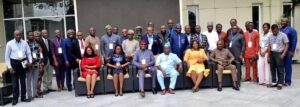Nigerian Editors and senior journalists who participated at a media roundtable organized by FrontFoot Media Initiative have called for consistent and detailed coverage of statutory government audit reports at all levels of government. They made the call during the third FrontFoot Media Roundtable held in Lagos on August 15, 2024, with the theme “The Nexus Between Media and Government Accountability”.
The roundtable which was aimed at enhancing government accountability and strengthening the role of the media in democratic governance brought together 40 editors from print and online media to discuss the critical importance of consistent and thorough reportage of statutory government audit reports across federal, state, and local levels.
In a communique released following the roundtable, participants emphasised that consistent reportage of audit reports as mandated by the 1999 Nigerian Constitution could significantly enhance the media’s capacity to hold governments accountable.
The senior media personnel at the roundtable noted that statutory audit reports, which provide credible insights into the management of state resources, are crucial for fostering transparency and accountability in governance. They however expressed their dismay at the growing trend of governors expanding their powers to undermine the Office of the Auditor-General, a move they said obstructs the media’s constitutional duty to scrutinize government actions as outlined in Chapter 2, Sections 2 and 22 of the Nigerian Constitution. The editors lamented the numerous challenges facing the media, including the lack of official support despite the rising costs of essential inputs in the industry.
The communique also touched on the challenges posed by the evolving intellectual property landscape, particularly concerning how global tech companies like Google interact with Nigerian media houses. Participants called for a review of these dynamics to ensure fair compensation and protection for local media content.
In response to the growing financial pressures on the media industry, the roundtable proposed the establishment of a Libel Defence Fund to support media houses facing legal challenges related to defamation. They also underscored the importance of improving the content and context of reporting, including government audit reporting, to better serve the public interest.
Participants recognized the paradoxical impact of technology on the media industry. They agree that though technology is an enabler that offers new tools for journalists, it has also created a divide between tech-savvy personnel who lack traditional journalism skills and experienced journalists who need to improve their digital literacy skills. The roundtable emphasized the need for the media to bridge this gap by prioritizing capacity building, retraining for veteran journalists, and education for new entrants into the field.
Acknowledging the absence of official support for the media despite the rising costs of essential inputs, the editors called for government intervention through tariffs and policies that would create a more conducive environment for media sustainability. They urged the media industry to reinvent itself to remain viable and relevant in the face of these challenges.
They stressed the need for enhanced collaboration between the media and civil society organizations to ensure the sustainability of the media ecosystem, citing organizations such as the Wole Soyinka Centre for Investigative Journalism, Media Rights Agenda, and the FrontFoot Media Initiative as key partners in this effort.
During the event, Mr. Lanre Idowu of the National Media Complaints Commission reported on the progress of the media ombudsman. He highlighted that the Commission had successfully resolved a case brought before it, enhancing public confidence in the media by upholding high standards of journalism ethics.
The roundtable concluded with a call for editors and supervisors to pay closer attention to the activities of outstation personnel, ensuring compliance with organizational ethos and encouraging follow-up reporting to prevent important stories from going unnoticed.
The media roundtable provided a platform for a wide-ranging discourse on the state of media practice in Nigeria. The event also served as a feedback forum for the media community on FrontFoot’s three-year training program, which has been equipping journalists across the country with the skills needed for effective audit reporting and enhanced government accountability.
The roundtable was organized with support from the MacArthur Foundation through the Wole Soyinka Centre for Investigative Journalism (WSCIJ) under the Collaborative Media Engagement for Development, Inclusivity and Accountability (CMEDIA) Project, a multi-level intervention that supports media independence, improved transparency, accountability, and good governance in state and local governments with more public awareness on the need for accountability, and amplified marginalised voices.







